Increasing popularity in the NAS hard drive space has pressed Seagate to release the highest capacity NAS HDD for the consumer on the market at this time – the IronWolf 14TB NAS HDD. This means that an 8-bay NAS can hold a total of 112TB of data without adding any expansion units, which is ideal for creative professionals, SOHO, and SMB’s that need to keep up with the rapid expansion of data requirements without crippling their budget. The Seagate IronWolf family features a 6Gb/s SATA interface, has a spindle speed of 7200rpm, features 1 million hours MTBF, and comes in smaller capacities ranging from 1TB to 12TB.
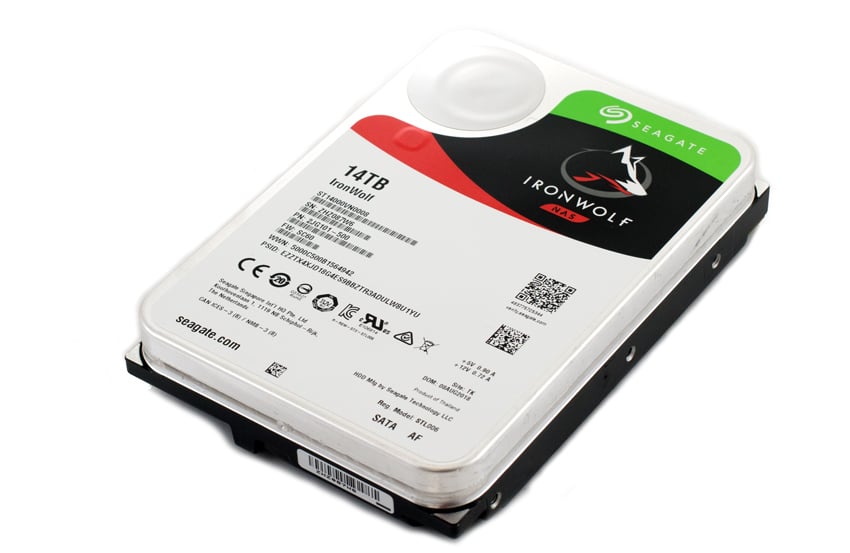
Much like the previously reviewed 10TB and 12TB IronWolf, the 14TB successor did not disappoint. This model, as you’d come to expect with the IronWolf NAS HDD family, is specifically designed for 24/7 operational run-time, equipped with AgileArray features including vibration tolerance, dual plan balance, RV sensors, RAID optimization, and more, to ensure it’s up to the task. Additionally, this drive comes with the embedded IronWolf Health Management software application, found in the 4TB+ IronWolf drives, providing users with monitoring, intervention, and data recovery options, keeping your safe and secure.
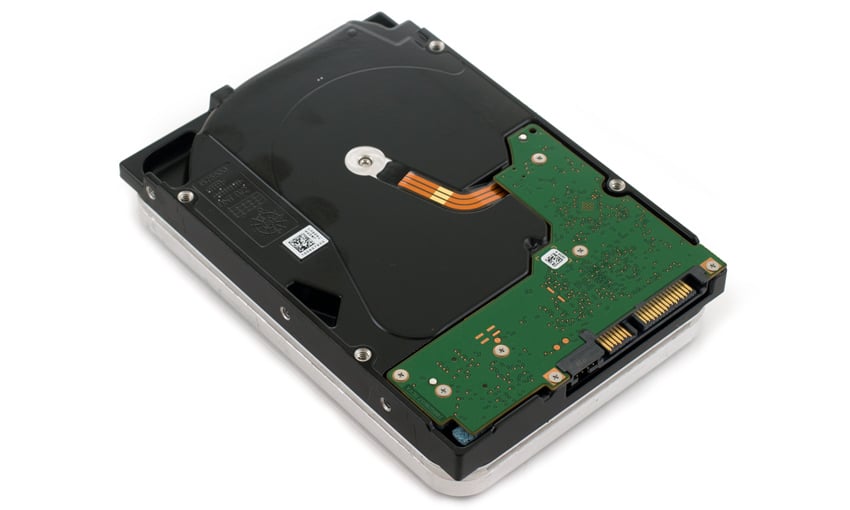
Backed by a 3-year limited warranty and Optional Seagate Recovery Services, the Seagate IronWolf 14TB can be purchased for $569.99.
Seagate IronWolf 14TB Specifications
| Standard Model Number | ST14000NV0008 |
| Interface | SATA 6Gb/s |
| Drive Bays Supported | 1-8 bays |
| Multi-User Technology (TB/yr) | 180 |
| Rotational Vibration (RV) Sensors | Yes |
| Hot-Plug Support | Yes |
| Cache (MB) | 256 |
| Mean Time Between Failures (MTBF, hours) | 1,000,000 |
| Power-On Hours per Year (24×7) | 8760 |
| Limited Warranty (years) | Yes 3-year |
| Performance |
Spindle Speed (RPM): 7200 Max. Sustained Transfer Rate OD (MB/s): 210MB/s |
| Power Consumption |
Startup Current, Typical (12V, A): 1.8 Idle Power, Average (W): 5.3 Average Operating Power (W): 7.9 Standby Mode (W): 0.8 Sleep Mode (W): 0.8 |
| Environmental/Temperature |
Operating (ambient, min °C): 5 Operating (drive case, max °C): 60 Nonoperating (ambient, min °C): -40 Nonoperating (ambient, max °C): 70 |
| Environmental/Acoustics |
Vibration, Nonoperating: 10Hz to 500Hz (Grms): 2.27 Idle (typical): 1.8bels Seek (typical): 2.8bels |
| Environmental/Shock |
Shock, Operating/nonoperating 2ms (max): 70/250Gs
|
Performance
Enterprise Synthetic Workload Analysis
Our enterprise hard drive benchmark process preconditions each drive-set into steady-state with the same workload the device will be tested with under a heavy load of 16 threads, with an outstanding queue of 16 per thread. The device is then tested in set intervals in multiple thread/queue depth profiles to show performance under light and heavy usage. Since hard drives reach their rated performance level very quickly, we only graph out the main sections of each test.
Preconditioning and Primary Steady-State Tests:
- Throughput (Read+Write IOPS Aggregate)
- Average Latency (Read+Write Latency Averaged Together)
- Max Latency (Peak Read or Write Latency)
- Latency Standard Deviation (Read+Write Standard Deviation Averaged Together)
Our Enterprise Synthetic Workload Analysis includes four profiles based on real-world tasks. These profiles have been developed to make it easier to compare to our past benchmarks, as well as widely-published values such as max 4K read and write speed and 8K 70/30, which is commonly used for enterprise drives.
- 4K
- 100% Read or 100% Write
- 100% 4K
- 8K 70/30
- 70% Read, 30% Write
- 100% 8K
- 128K (Sequential)
- 100% Read or 100% Write
- 100% 128K
In the following section of this review, we will show the 14TB Seagate IronWolf's performance in both iSCSI and CIFS configurations compared to the 12TB and 12TB Pro models as well as the 14TB Pro model. Seagate supplied StorageReview with 8 samples of their new NAS HDDs, which we configured in RAID6. All the drives were tested in our NETGEAR ReadyNas 628X.
Looking at our throughput test which measures 4k random performance, the 14TB IronWolf took second in iSCSI performance with 668 IOPS read and 954 IOPS write, outperforming its 12TB IronWolf and IronWolf Pro predecessors but falling short of its 14TB Pro counterpart. Similarly, the 14TB IronWolf took second in CIFS performance with 332 IOPS read and 649 IOPS write.
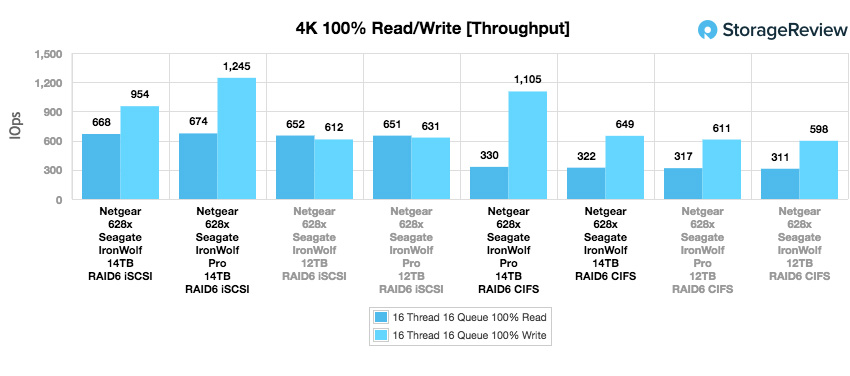
Next, we’ll be looking at 4k average latency where, much like the aforementioned, the 14TB IronWolf kept second in all categories. The 14TB IronWolf drive hit latencies of 383.03ms read and 271.92ms write in the iSCSI configuration. In CIFS, the 14TB IronWolf showed latency levels of 792.81ms read and 402.40ms write.
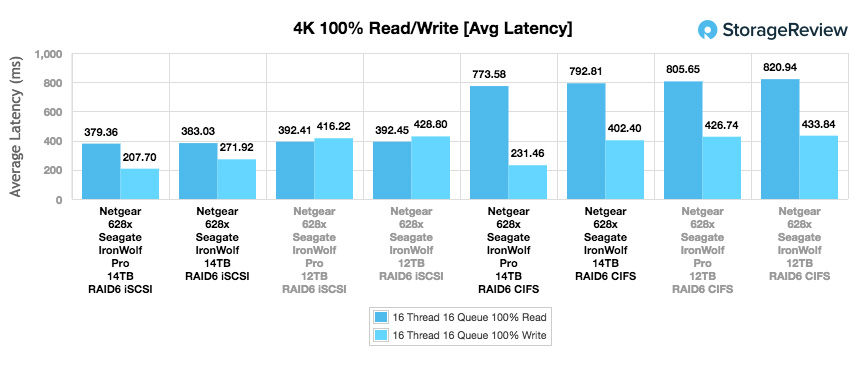
With 4k max latency, the 14TB IronWolf dropped to third in write with 18,632.0ms but held its second place position in read with 3,773.9ms, being overtaken by the 12TB underdog. iSCSI told a different story, putting the 14TB IronWolf in last in read with 4,364.3ms, but only fell short of the 14TB Pro in write with 13,146.0ms.
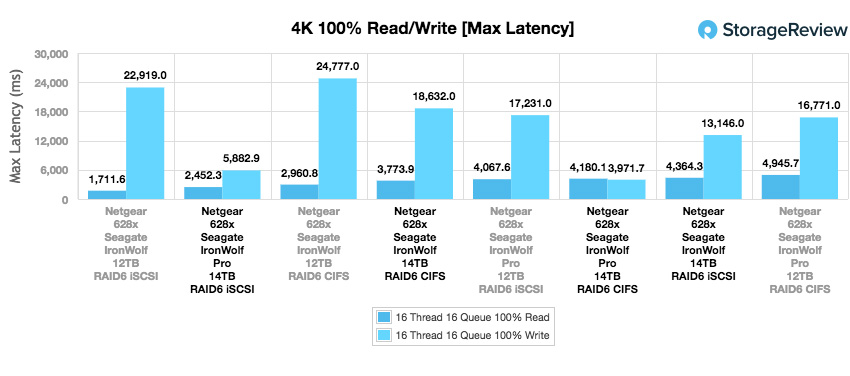
In standard deviation, the 14TB IronWolf showed 465.92ms (iSCSI) and 651.14ms (CIFS) in reads, while it measured 1,389.79ms (iSCSI) and 1,803.40ms (CIFS) in write.
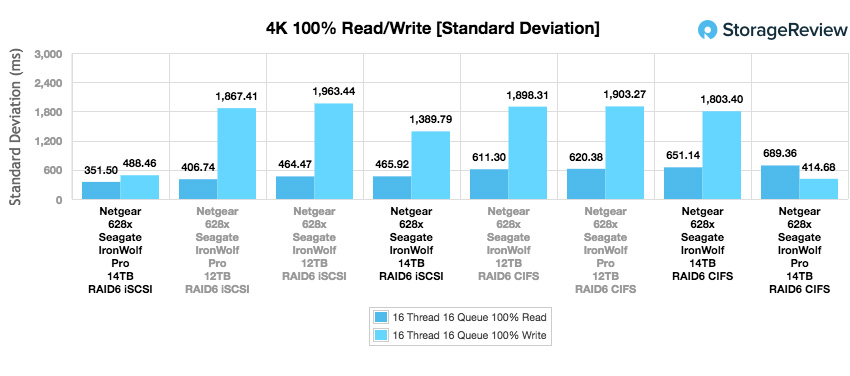
The next benchmark tests the drives under 100% read/write activity, but this time at 8k sequential throughput. In iSCSI, the 14TB IronWolf jumped to the top in read with 173,277 IOPS but fell all the way to the bottom in CIFS, showing 91,347 IOPS read. Looking at write speeds, it placed third in iSCSI, showing 51,215 IOPS, and second in CIFS with 43,955 IOPS.
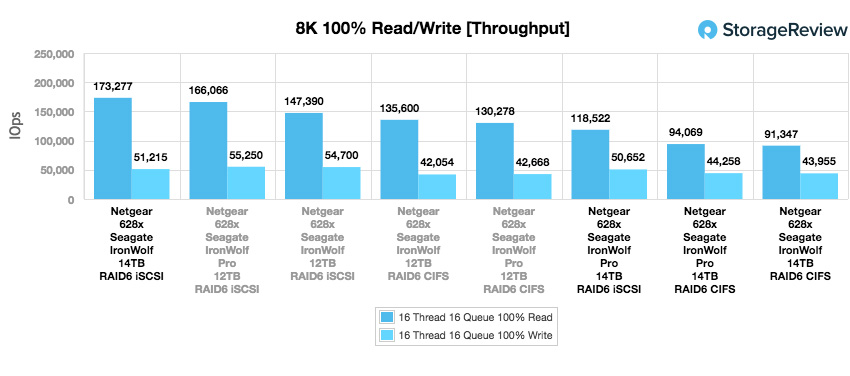
Our next test shifts focus from a pure 8k sequential 100% read/write scenario to a mixed 8k 70/30 workload, where we will show how performance scales in a setting from 2T/2Q up to 16T/16Q. In CIFS, the 14TB IronWolf started ended at 196 IOPS while remaining very consistent throughout. In iSCSI, it started strong at 460 IOPS, but fell behind the 12TB Pro and non-Pro models, ending at 632 IOPS.
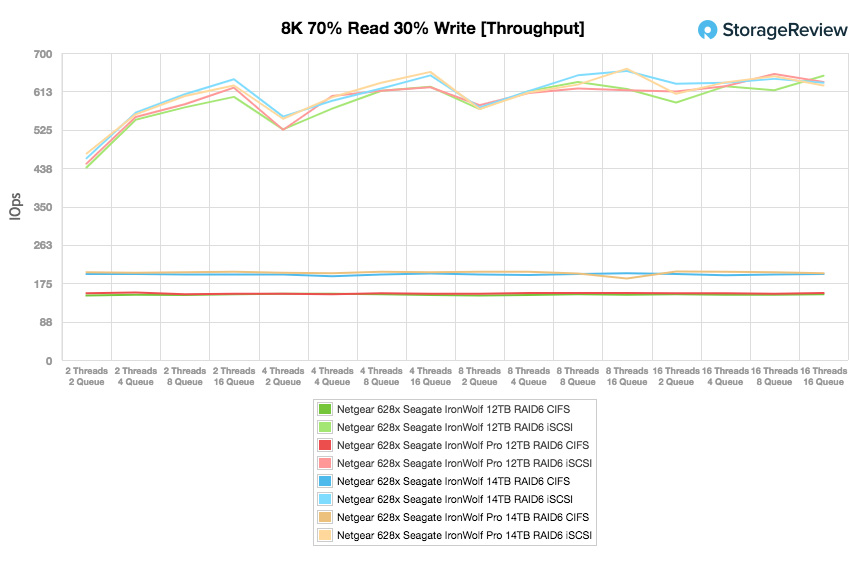
With average latency at 8k 70/30, the 14TB IronWolf posted a range of 20.29ms through 1,293.66ms in CIFS, and 8.67ms through 403.65 in iSCSI, putting it in second and third place, respectively.
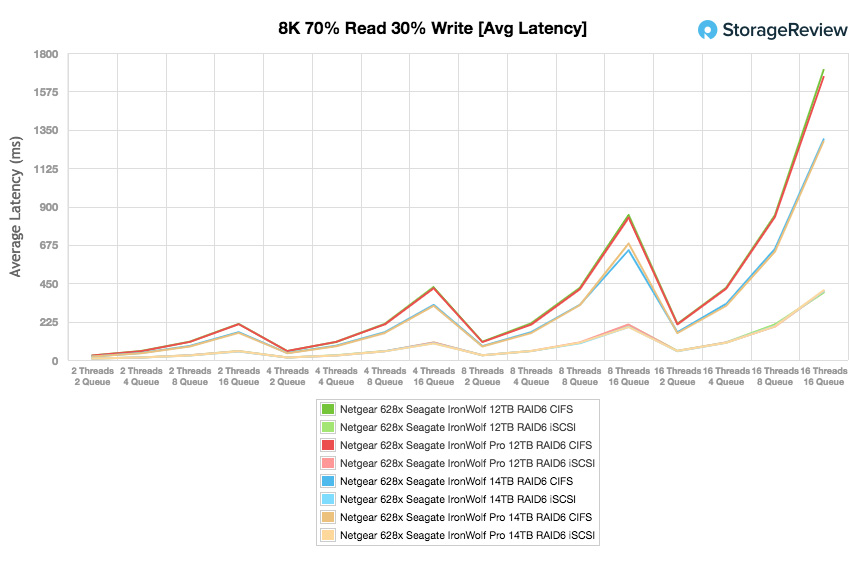
In max latency, the 14TB IronWolf held the top spot in the iSCSI configuration, ending at 6,629.25ms. CIFS, on the other hand, saw the 14TB IronWolf fall way behind at 6,348.31, making the end result nearly half that the other drives.
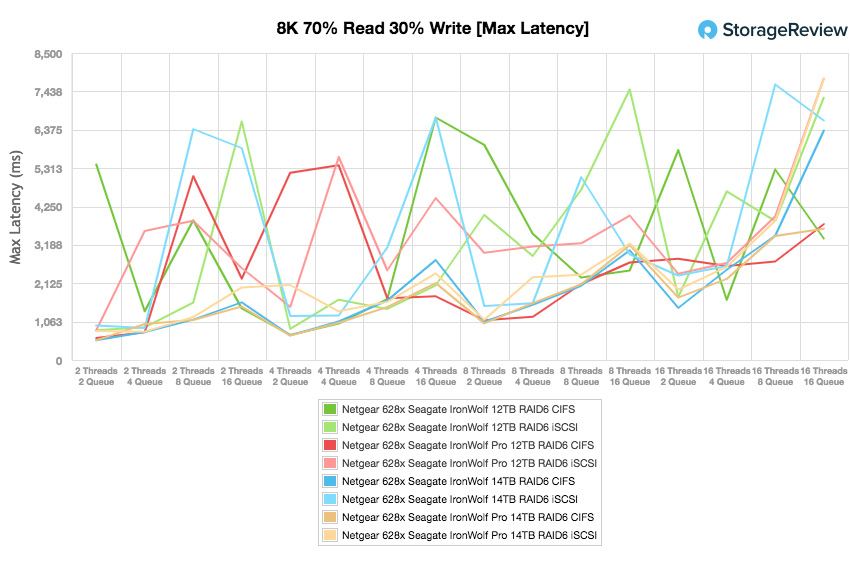
The standard deviation latency results for our 8k 70/30 benchmark showed 607.8ms in iSCSI but fell in last again in CIFS at 547.98ms.
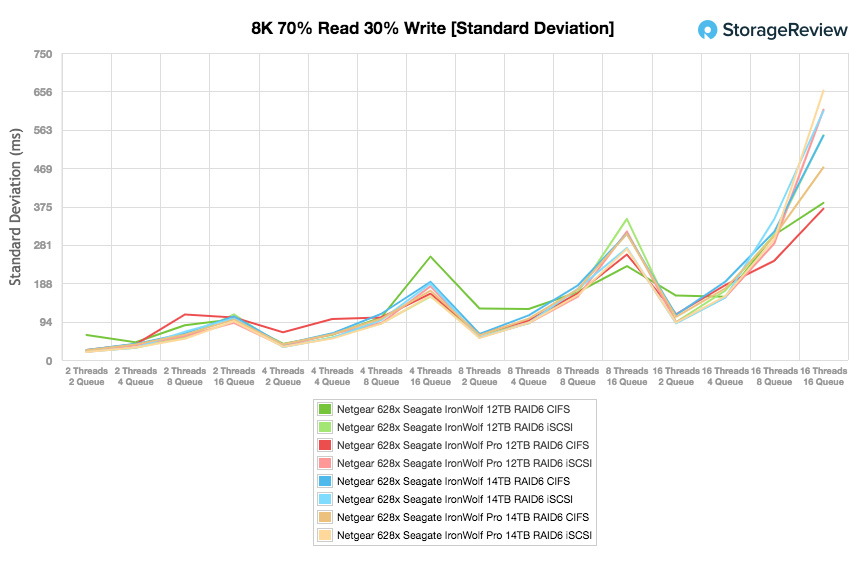
Our last test is the 128k benchmark, which is a large-block sequential test that shows the highest sequential transfer speed. The 14TB IronWolf was outperformed by the other drives in read under the CIFS configuration at 1.035GB/s but held second in write at 1.26GB/s. The placement results were the same in iSCSI, with the 14TB IronWolf at 1.75GB/s read and 1.16GB/s write.
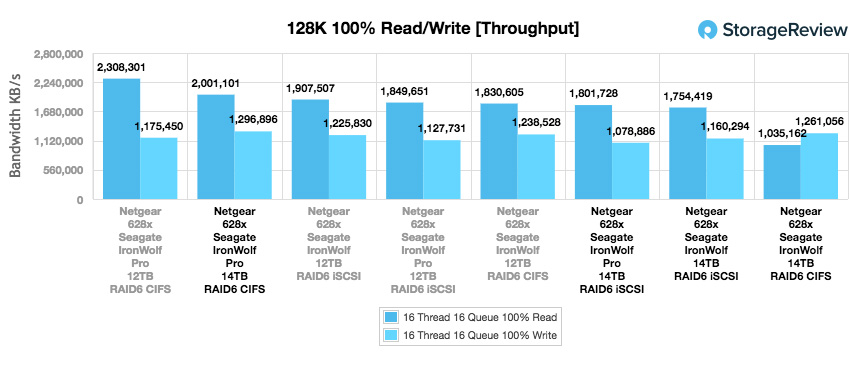
Conclusion
The Seagate IronWolf is ideal for SOHO and SMB’s who are looking for lots of raw data capacity without crippling their budget. Additionally, its 14TB capacity is only met by the similar-priced Barracuda and the IronWolf Pro in the consumer-facing market, making it very attractive to the creative professional looking to capture and store raw 4k and 8k videos, and SOHO/SMB’s needing to expand their data capacity without breaking the bank.
In this review, we fully populated the 8-bay Netgear ReadyNAS 628x with 8 drives to demonstrate how the Seagate IronWolf 14TB would stack up in different scenarios against the 12TB Pro and non-Pro, and the 14TB Pro version. Overall, the 14TB performed very well in most cases, but fell short in 8k 70/30 max and standard deviation latency under CIFS and 4k read latency under iSCSI. However, it was able to move to the top of the charts in 8k sequential throughput at 173,277 IOPS and 8k 70/30 max latency at 6,629.25ms under iSCSI configuration. Additionally, the 14TB IronWolf was able to outperform all other drives in 128k 100% read at 1.035GB/s under CIFS.
The Seagate IronWolf 14TB NAS HDD is a solid NAS drive that offers great performance, reliability, and flexibility, making it perfect for SOHO, SMB’s, and creative professionals.




 Amazon
Amazon